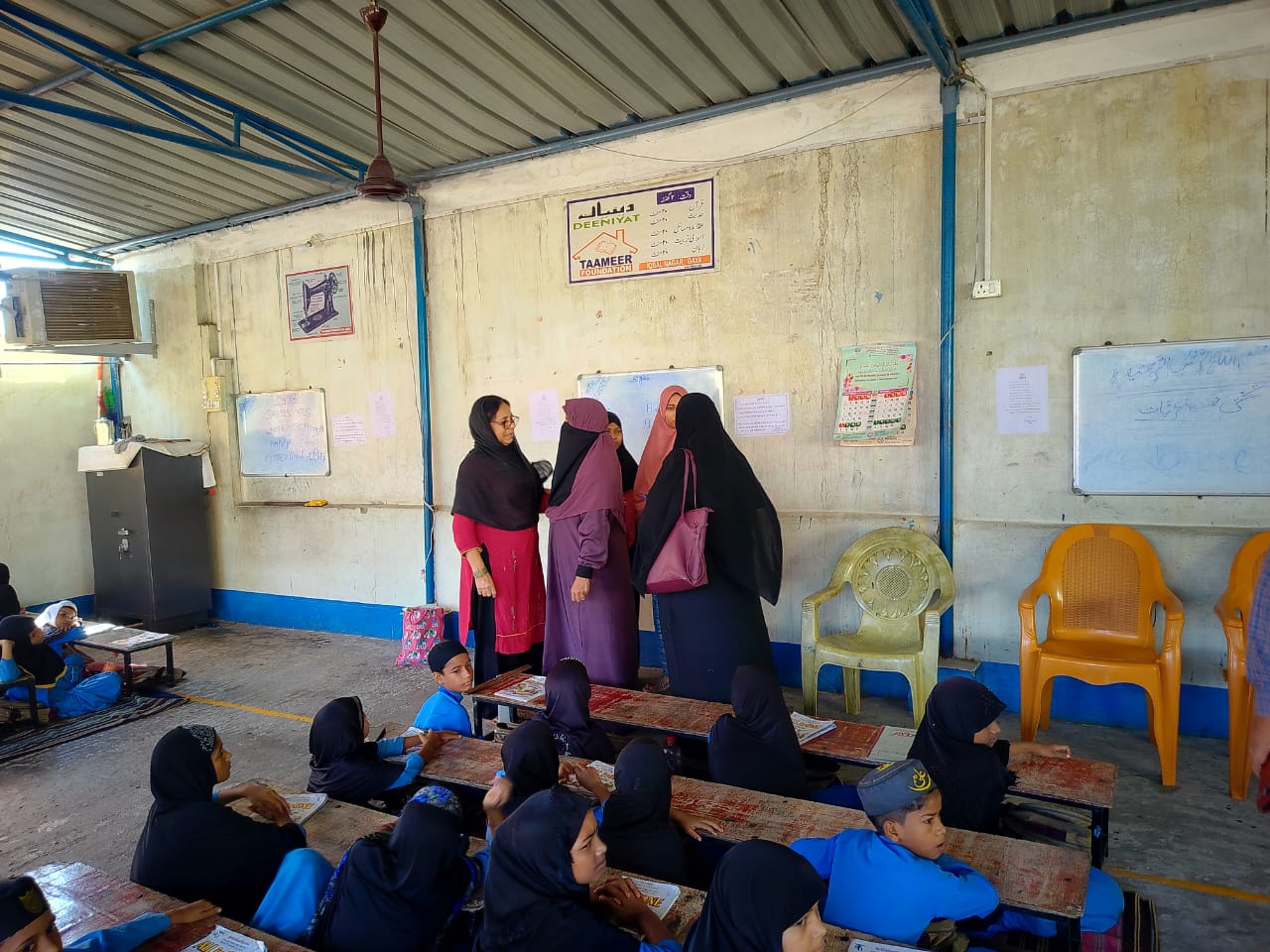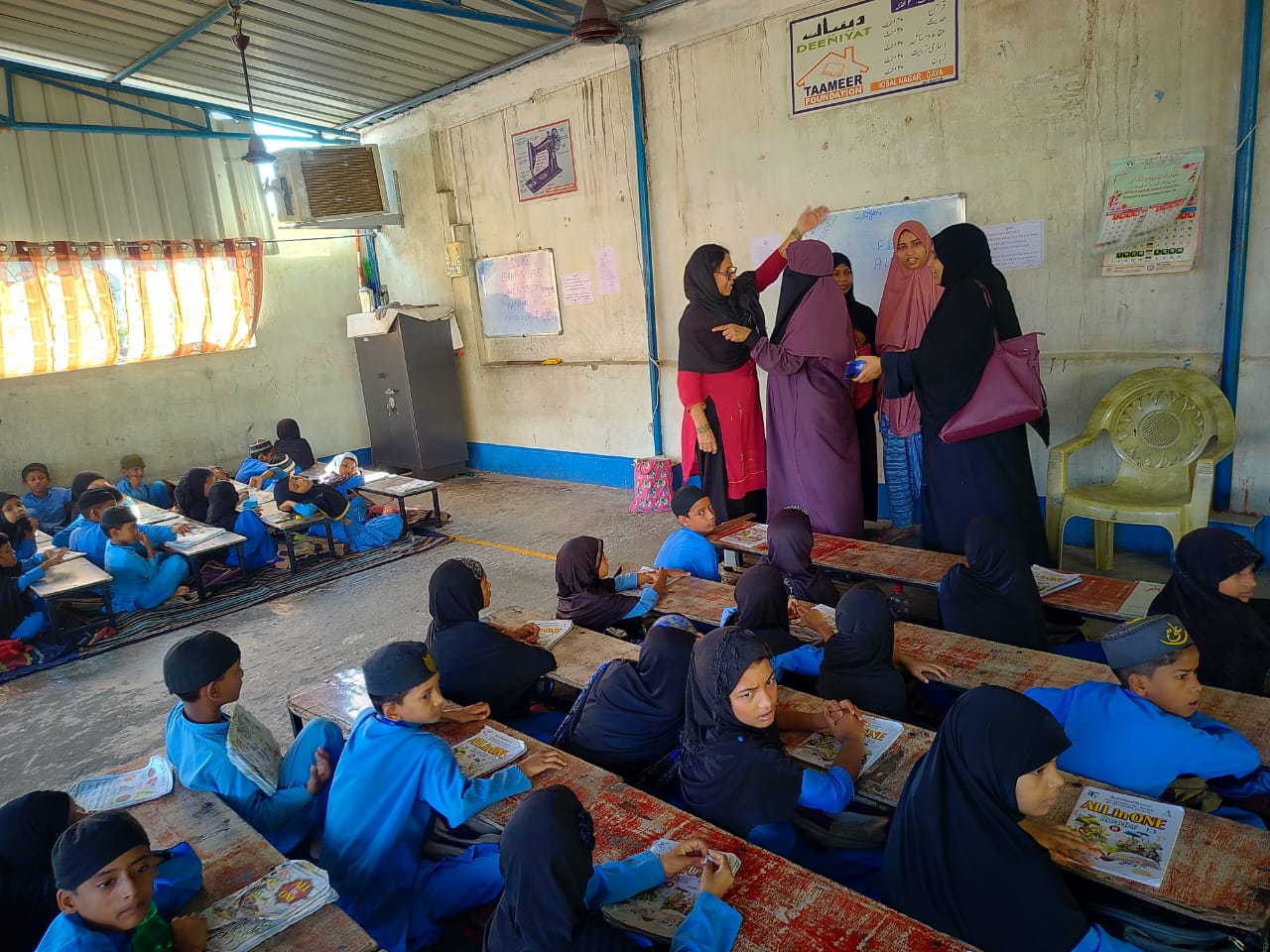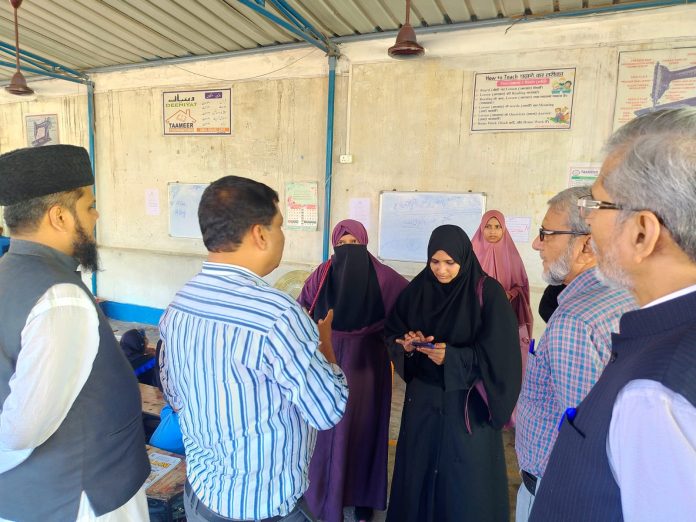– Rabia Basri
Alhamdulillah, the recent visit to Bihar for the Tanzeemi and Tarbiyati programme, followed by visits to JIH institutions to observe their functioning, was nothing short of inspiring. The journey, especially in the historic city of Gaya, became even more enriching in the esteemed company of Mrs. Shaista Rafat, National Secretary of Jamaat-e-Islami Hind (JIH), and Maulana Rizwan Ahmad Islahi, Ameer-e-Halqa of Bihar; Shaukat Ali, PR Secretary; Nesar Ahmad, Halqa Secretary; Ameeruddin, in-charge of Slum Schools; and Qamar Warsi.
 One of the most striking revelations during this visit was the sheer scale and diversity of institutions being managed by JIH Bihar. I was pleasantly surprised to learn that there are 29 active institutions spread across the state. These include microfinance projects, two hospitals, formal schools, madrasas, and slum schools – all functioning with the common goal of uplifting society, empowering communities, and serving people irrespective of their backgrounds.
One of the most striking revelations during this visit was the sheer scale and diversity of institutions being managed by JIH Bihar. I was pleasantly surprised to learn that there are 29 active institutions spread across the state. These include microfinance projects, two hospitals, formal schools, madrasas, and slum schools – all functioning with the common goal of uplifting society, empowering communities, and serving people irrespective of their backgrounds.
Speaking about the breadth of work, JIH Bihar Ameer-e-Halqa shared:
“Our institutions are not just buildings or programmes; they are lifelines for communities. Each school, hospital, and project is a step towards empowering people with knowledge, dignity, and self-reliance.”
Among these, one initiative particularly touched my heart, the slum school in Iqbal Nagar, Gaya.
The Story of Iqbal Nagar Slum School
When we visited the school, we were welcomed warmly by the in-charge and teachers, who shared the fascinating journey of this institution. The school’s history goes back 20 years, to a time when Iqbal Nagar was an entirely underdeveloped locality. At that time, the area lacked proper housing, roads, and even basic facilities. The local residents lived in extreme poverty, struggling daily for survival.
 Initially, the local Jamaat members used to support the people by distributing livelihood essentials – food, clothing, or other necessities – especially during festivals or adverse weather conditions. But after some years, the leaders realised that these short-term relief efforts, though helpful, would not bring about lasting change.
Initially, the local Jamaat members used to support the people by distributing livelihood essentials – food, clothing, or other necessities – especially during festivals or adverse weather conditions. But after some years, the leaders realised that these short-term relief efforts, though helpful, would not bring about lasting change.
Recalling that turning point, the school in-charge explained:
“We realised that if we only keep distributing things, the area will never grow. The real development would come only through education. That is when we decided – whatever it may be, we must start a school.”
Thus, with the vision and support of the Jamaat leaders of that time, a modest slum school was started in Iqbal Nagar.
Growth and Structure of the School
Over two decades, this humble initiative has grown into a comprehensive educational and skill development model. The school is run in three structured sessions, catering to different needs of the community:
Morning Session – Tameer Primary School:
A full-fledged primary school where nearly 140 children study from LKG to 5th standard. The school follows a complete syllabus covering all subjects, laying a strong foundation for the students.
Afternoon Session – Maktab:
Religious and moral education is provided to both the students of Tameer School as well as other children from the community. This ensures holistic development, balancing modern education with spiritual and moral guidance.
Evening Session (4 to 6 pm) – Stitching Centre:
A vocational training centre where 25 to 30 girls and women regularly come to learn stitching and tailoring. This initiative equips women with practical skills that can help them earn an income and support their families.
What makes this effort even more remarkable is that the entire institution is managed by women. From teaching to vocational training, women are leading the way with confidence and dedication.
As Mrs. Shaista Rafat observed during the visit:
“This school is proof of how women can drive social change. Their dedication, patience, and sincerity have transformed not just children, but entire families in this locality.”
Impact on the Community
The in-charge of the school shared the incredible transformation that the initiative has brought about in the last two decades. According to her, 90% of the children in the locality have studied at this school. Many of them, after completing their primary education here, have gone on to continue their studies in government schools, supported and guided by the institution.
In-charge reflected proudly:
“Today, when I walk in the streets of this area, almost every child I meet has, at some point, studied in this school. That is the biggest satisfaction for us.”
The ripple effect of this effort is visible in the improved living conditions, better awareness, and increased opportunities for the residents. What was once a neglected slum has now become a community empowered through education and skills.
A Model for the Nation
Standing in Iqbal Nagar, interacting with the teachers, I felt an immense sense of joy and admiration. This initiative is a model of community transformation that deserves to be replicated in slums and underdeveloped localities across India. The combination of formal education, religious instruction, and vocational training creates a balanced approach that addresses both the present and future needs of society.
In-charge of Slum school expressed:
“Twenty years ago, nobody believed this area would change. Today, because of this school, our children dream bigger, and our families live with dignity.”
Concluding Reflections
The entire visit to Bihar, and especially to Gaya, left a lasting impression on me. Alhamdulillah, I returned with a heart full of admiration for the work being done by JIH Bihar. The passion of the leaders, the dedication of the institution in-charges, and the resilience of the teachers and students are all testaments to the power of faith and collective effort.
The slum school of Iqbal Nagar is not just an educational institution; it’s a story of transformation, hope, and vision. If such models are adopted more widely, they can play a pivotal role in reshaping our society for the better.
Indeed, this experience was not only wonderful but deeply inspirational.
[The writer is National Assistant Secretary of Jamaat-e-Islami Hind]




